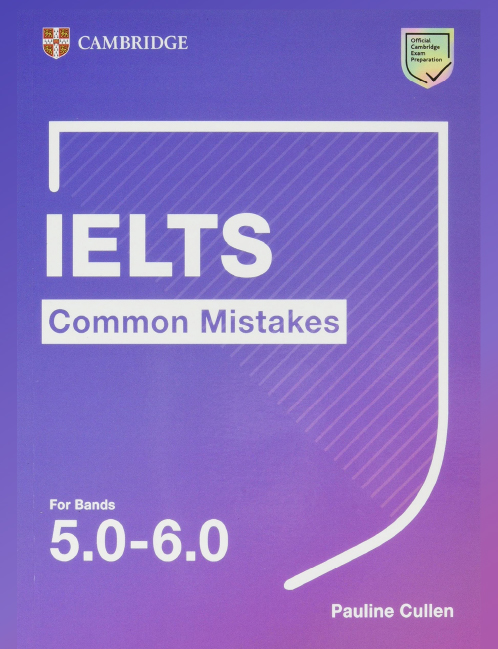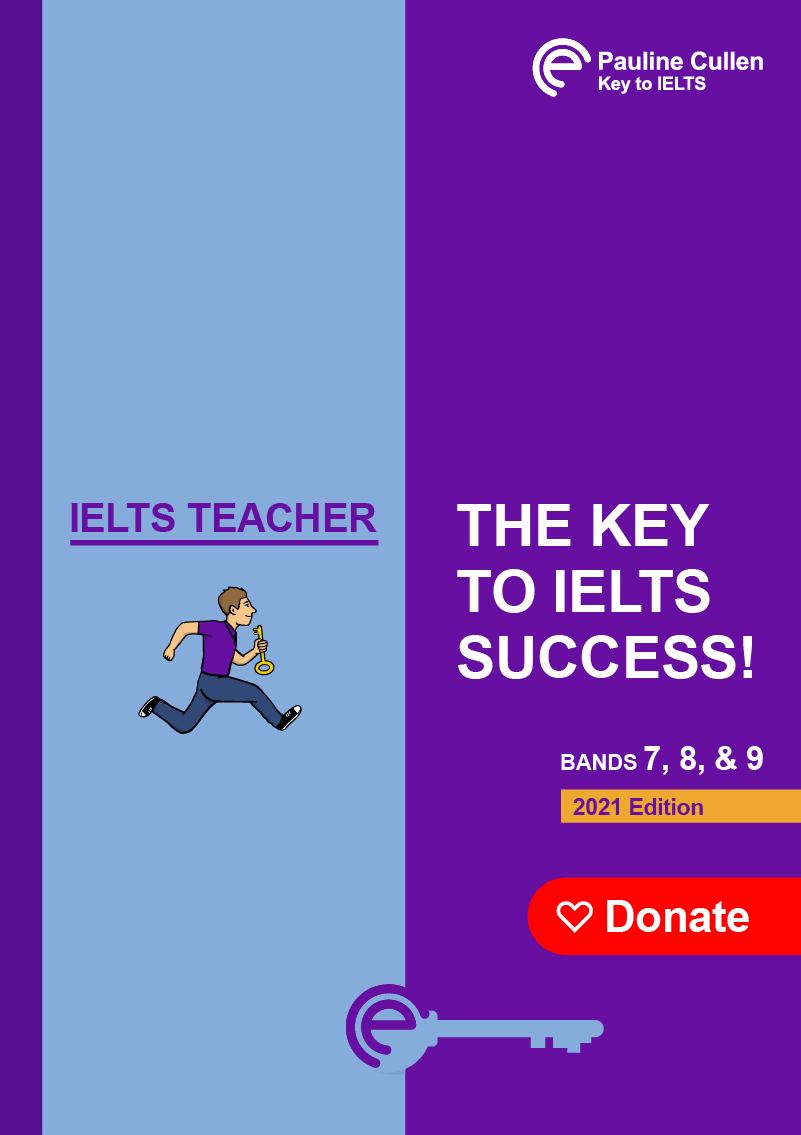This post contains answers to exercises in my free book, The Key to IELTS Success as well as links to the resources mentioned in the book.
Chapter 2
Prepositions test from Common Mistakes at IELTS Intermediate, Test 5, page 28

Chapter 4
Were you able to correct and identify the most common grammar mistakes in writing task 1?
This task has been updated in the new second edition. To avoid all of these mistakes, you can buy a copy of Common Mistakes at IELTS Intermediate here:
To learn how to write answers for Academic Writing Task 1, follow my Task 1 writing course:
Chapter 6
To find a link to my post about tone in GT writing task 1 click here
Click here to see an academic writing task 1 sample with examples of an overview.
Chapter 7
Language corrections for the thesis statements based on popular advice:
1) I agree with this view due to the reasons fact that online learning is inexpensive and can be more convenient than the classroom-based learning.
3) Two problems have arisen as a result of this; first, it has contributed to the destruction of the natural habitats and second, it has had an impact on the air quality.
4) There are two major problems related to this; however, there are solutions to help tackle them // that can be used to tackle them.
Chapter 8
Click here to find a link to the webinar about How to Improve your IELTS Score.
You can find all of my talk and videos by clicking here
If you haven’t read The Key to IELTS Success, you can find it here:






Dear Pauline, After reading your books and posts, I have tried to improve my IELTS writing way and specially focused on Task response( covering every aspect and not repeating, giving my opinion throughout and taking notice of coherence and cohesion). It’s my first attempt to write a whole essay on following your advice.
Can you please read it and suggest me what I should improve.
NB: I can’t extend introduction after interpreting the question in my own words, is this alright to keep it like this ?
The question is from your book Offical Cambridge Guide to Ielts
practice test 2:
One of the consequences of improved medical care is that people are living longer and life expectancy is increasing.
Do you think the advantages of this development outweigh the disadvantages?
In the past, people would usually die soon after 60 years. Nowadays, average lifespan of an individual has raised by 20 years, due developments in the field of medicine.
Increase in lifespan has led people to enjoy their lives in late years. As they are retired and have no family or work life responsibilities, they can spend their time in doing activities which they always yearned for doing in their young lives. For instance, if someone had a passion for travelling during working years but couldn’t pursue due to workload, now he/she can fulfil it in the post-work life. Moreover, they will have their all-life savings along with them to help them enjoy luxurious trips, which they couldn’t afford while being young.
However, living longer is likely to make people fall into depression and other psychological diseases at a rate unparalleled than before. It appears to be because of consumption of strong medicines, which are taken for proloning human life. They have the tendency to disturb nervous system coordination; as a result, they make muscles and organs strong but might deteriorate nervous system and elders probably develop mental disorders. Hence, physically person is functioning but at the cost of huge damage to psychological health.
Thus, it seems that stretching the years of life isn’t fruitful, improving the quality of life is utmost. In my view, disadvantages have enormous impact on us as compared to advantages.
Dear Pauline, I would be very grateful if you can have a look and comment on my essay.
What I feel in the body paragraph one, I have stated an advantage that is “ENJOY LIFE”, explained slightly implicitly my opinion by language use but I didn’t answer in this paragraph that why I think this advantage is of less value than the disadvantage. However, I did mention in conclusion but not in the body paragraph. Is this alright approach? to state advantage and your opinion(by language use) and not answer it explicitly in body para one that why this advantage holds less value than disadvantage.
Sincerely,
Anam
Dear Pauline,
Thank you so much for your service! You lessons and comments are of great help to clarify what actually IELTS is looking for in the candidate’s response. I am looking forward to your next book on writing. May I ask what is the estimated time for your book to be public?
Best Regards,
Anh Mai
Hi Ahn Mai, I don’t have a fixed publication date yet, but I will keep everyone up-to-date with any progress. I’m glad you’re finding the page useful 🙂
Hi Pauline,
How’s everything? It’s been a while since we last spoke. How’s everything going with your writing book?
I had this IELTS speaking workshop yesterday and the question of accent came up, so I thought maybe I could run it with you; we know from the band descriptors that accent is not tested in IELTS (or any other test of English proficiency for that matter), and I know of many native Englisher speakers who slip between two accents because they’ve lived in different countries.; that said, would a candidate be still qualified for a 9 if they spoke in a mix of, let’s say, British and American English (for as long as it does not affect intelligibility) or would that take away from the element of naturalness needed at band 9?
P.S. I attend several events on IELTS every month in Iran, and I would be more than happy to publicize your next book if the publication date is approaching.
P.S.S. I couldn’t find a speaking thread to post the question in, so I just posted it under the least irrelevant topic.
Hi Behrooz! All is going well – though the progress with my book has slowed as I had to make room for paid work commitments. I will be able to devote more time to it very soon though and I will keep you informed. Someone else asked me about accents only yesterday, and my response was similar to what you say here. My own accent, for example, is a mixture of British and Australian. The difference often shows with vowel sounds, but as it is consistent, I don’t think it causes problems. Personally, I would always be listening to myself to notice any words that I realised I was producing in what may seem an odd way to an examiner who was British or one who was Australian. I know that I do unconsciously adapt my accent, in fact, if I am something of a chameleon in that I inadvertently take on the accent of the person I am talking too (this can be embarrassing if they are Irish or Scottish as it sounds as though I may be making fun of them, when I am not!) Because of this tendency, I do tend to try to be aware of my accent and pronunciation. As you rightly say, it is only as issue in as far as it causes comprehension problems or confusion, so I do not believe is would interfere with a band 9 score. I hope this helps! P.S I do plan on adding some more speaking posts soon.
Thanks a lot Pauline, you’re always a great help.
And good luck with the book, I’ll be looking forward to it.
Hi Pauline,
I want to ask a question about IELTS reading. Why some summary completion task have a title and some others don’t? Thank you.
Can you tell me where you have seen a summary completion task without a heading?
Hi again,
I took the real Ielts test a couple of weeks ago and there was a summary completion using the words from the passage, and because I thought summary completion tasks should always have a title I was surprised.
Without seeing the task I can’t really help – if this was a test you took yourself (and not one reported and shared by others) then it is possible that a heading was unnecessary or unhelpful.
Yes, actually it was a test I took myself, there were two paragraphs in the task which meant the answers were in two different paragraphs of the passage, but to my surprise the answers to the first paragraph questions were in paragraph 2 of the passage, and the answers to the second paragraph of the summary were in paragraph 8 of the passage, which made it hard to imagine how a title could fit for this task. Before the summary completion task there was a diagram labelling task to which the answers were in paragraphs 2 to 7, and after the summary completion there were two multiple choice questions, one of which was about choosing the right heading for the passage.
So, I hope you can see that giving a title would probably have been unhelpful in this instance. As you found the answers, I am sure that there were other means used to help you to navigate through the passage efficiently.
Hi Pauline,
I have a question about the band descriptors for speaking, we see that for bands 5 and 4 the candidate can produce basic sentence forms. What does it mean by basic sentence forms? Does it mean simple sentences or are some compound or complex sentences considered basic sentence forms? Thank you in advance for your help.
I talk about what ‘basic’ means in the grammar and vocabulary chapters of my free book. There is also a chapter about speaking which will help. Here is a link:https://keytoielts.com/product/ielts-teacher-the-key-to-ielts-success/
Hi Pauline,
I am an IELTS teacher and I have a question about the speaking test. Could you please tell me that if a candidate misunderstands the question and talks about an irrelevant topic, what criteria in speaking is affected and where is this mentioned in the band descriptors? Because I couldn’t find any reference to this problem in the descriptors. Thanks for your help.
Hi Okman, when you say ‘the question’ do you mean in part 2 of the test? If the candidate has not understood a question and speaks on something different then the examiner will ask a new question or rephrase it to help. It isn’t something that is assessed. Have you read the speaking chapter of my free book? That may help.
Hi Pauline,
I have read your free book from cover to cover, and I’m eagerly waiting for your writing book. Actually I meant questions in part 1 or 3. Sometimes the candidate misunderstands the question in those parts, so what criteria in speaking is affected when that happens?
And about what you said about part 2, my student took the real test 5 weeks ago and the topic in part 2 was adventure, but she didn’t know the meaning of the word adventure and instead talked about an advertisement, but she was neither stopped nor helped by the examiner. So are you saying that the examiner HAS TO stop her and explain the topic card if she is talking about something irrelevant? Because I have heard no help is given in parts 1 and 2 of the speaking test.
Thanks a lot for your help.
In part 1 and 2, the examiner will interrupt and give a new question or rephrase it. The only way that the candidate is penalised is if they do this deliberately to be able to give their own prepared / learned answers. As I explain in the speaking chapter of the book, some candidates need to be interrupted several times and their learned answers are not assessed. So, they are penalised in that they reduce the amount of time they have to show their speaking skills. With task 2, an honest mistake would not be penalised but at attempt to give a learned answer on your own topic would be. The examiner would try to bring the candidate back to the topic by pointing at the information on the card.
Hi Pauline,
I am Hira and I took the IELTS test on 27-04-2019.Although, I scored between 7 and 7.5 in reading, writing and speaking, listening fell short of a 0.5. I had to score 8, instead got 7.5.Therefore, I need some useful tips on listening.
Hello, Hira, you;ll find everything you ned to know in the listening chapter of The Key to IELTS Success. Here is a link:https://keytoielts.com/product/ielts-teacher-the-key-to-ielts-success/
Hi pauline, please help me ,i am rrally very depressed.
My ielts exam was on 26th october 2019 and in writing task 2 i got a topic about large shopping centers V small local shops.
And i wrote a balanced view as such positive aspects in first body paragraph with example and negative view of supermarkets on second body paragraph with example and i conclusion i wrote that although mushroom growth of big malls pose real threat over local corner shops but i believe the advantages are more amd then i rephrased the advantages.
Pauline, my concern is Is it a right approach… Because i am very worried that i only have to take one side either positive or negative. Please tell me if the way in which i have attempted is correct or. Not?
Mine is also Same question Pauline!
Hi Karan, I have edited your question as I do not share past live essay questions. Your plan seems perfectly fine to me – you argued that this is a positive development in spite of the impact on small shops. Why you think that you should only discuss one side?
Pauline, i feel this way because my friends told me after exam that i misunderstood the question as the question was WHAT DO YOU THINK IS THIS A POSITIVE OR NEGATIVE DEVELOPMENT? .So they said that in this type of question you have to take just one side either positive or negative and remain stick to that throughout whole essay… But instead in my thesis statement i wrote , While in my opinion,supermarkets provides a lot of benefits to consumers as these provide variety of services under one roof but also these pose a real threat over corner shops.Both the views will be discussed in the subsequent paragraphs.
Then i wrote a balanced opinion as mentioned in the earlier comment.
However, in conclusion i wrote although large big malls has several demerits over local corner shops but i believe the advantages are more and then i rephrased the advantages mentioned in body pragaragraph 1.
Pauline, my concern now is that my task response will not be considered good as i have provided a balanced view..is it true?? If yes, how much band score can i expect in task response criteria?
Hi Karan, this response is exactly why I say that questions shared after the test are no longer authentic because people change them based on 1) their memory 2) their interpretation of the question 3) their language level and, 4) their beliefs about question ‘types’. I have seen one example shared on a website that claims the test question said ‘Which opinion do you most agree with?” No authentic IELTS question asks this. You did not misinterpret the question, you used what you know about the Task response criterion (see Chapter 7 of The Key to IELTS Success) and applied this knowledge to help you answer in a balanced way.
Okay,so that means on this question even my balanced response is good..right? And i don’t need to worry that this will affect my band score?
I don’t know what you mean by ‘even my balanced response is right.’ A balanced response is always the right approach to take.
What did you score?
Dear Pauline,
I have a question about the below sentences in chapter 7:
Original sentence: Two problems have arisen as a result of this; first, it has contributed to the destruction of the natural habitats and has impacted the air quality.
=> Two problems have arisen as a result of this; first, it has contributed to the destruction of natural habitats and second, it has had an impact on air quality.
Impact is also a verb so why can’t we use “has impacted” here.
Thank you.
Hi An
Impact is used as a verb in the US but not normally in the UK or Australia. Although people in the business world do tend to follow the same patterns as the US (especially in using nouns as verbs), this does not always sound right in a formal discursive essay (it sounds like business jargon to me). If you look, you will probably only find it being used in business communication.